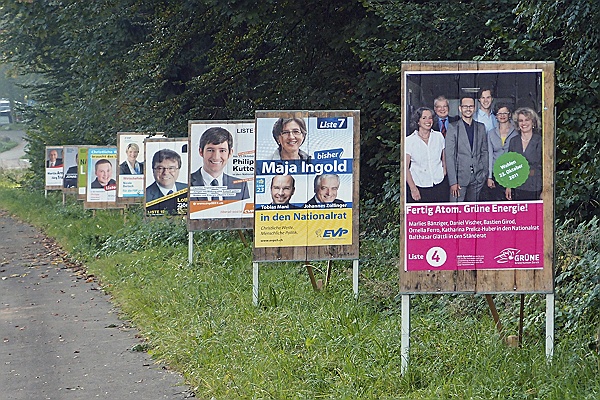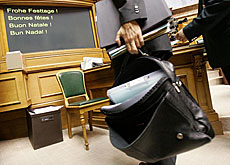Secret election funding taken to task again

Switzerland has once again been criticised for the lack of transparency on political party funding, particularly during election periods.
The Council of Europe’s monitoring platform, the Group of States Against Corruption (Greco), has also criticised Switzerland’s low rate of bribery convictions, with none being handed out in the private sector.
Despite its image of fair democracy and good governance, Switzerland is one of the few western countries where politicians and political parties do not have to declare how they are funded.
Public concern about this anomaly has been growing over the last few years with several column inches being devoted to the theme in the media in the run-up to the recent general election.
With political party spending rising with each election campaign, the debate on how much influence corporations and wealthy individuals have on the democratic process has been getting louder.
Accountability needed
Political parties on the left have been campaigning for years to change the system, but their concerns have always been confounded by parliament. There have so far been no popular votes on the issue.
International organisations, such as Transparency International, the Organisation for Security and Cooperation in Europe and the Democracy Barometer, have also branded the lack of transparency a weakness of the system.
On Friday, Greco became the latest influential group to find fault with the system. The report was initially scheduled for release in October, just two days before the Swiss general election, but was not authorised for publication by the Swiss government until Friday.
“The current situation would call for the introduction of regulations on transparency and reasonable oversight of political party and election campaign financing, whether or not it is decided to introduce some form of public funding,” the Greco report stated.
“It is necessary for political parties and candidates for election to maintain full and complete accounts and for these accounts, together with information on donations received above a certain size, to be presented to an independent authority.”
The system of popular initiatives, in which citizens can propose and vote on new laws, should also come under scrutiny given the amounts of money spent on campaigning many issues, the Greco report added.
Incompatible
The organisation also recommended the establishment of an independent auditor to examine the accounts of political parties. Greco’s recommendations apply to both cantonal and national elections.
In August, Transparency International (TI) reiterated its position against the opaque political funding system in Switzerland.
The watchdog group argued that the lack of transparency was incompatible with Switzerland signing up to many international anti-corruption standards in recent years, including membership of Greco since 2006.
“In order to carry out their civic responsibilities, voters must know where the money comes from and who finances parties and important participants in Swiss politics,” the group said in its position paper.
TI welcomed Greco’s report, but also called for a cap on donations and expenses for political parties, campaigners and candidates.
In response the criticism, Swiss Justice Minister Simonetta Sommaruga recently commissioned an evaluation of the issue. Parliament will debate the findings next year and a report will be submitted to Greco in 2013.
“We want to look into the state of funding during the last election and in previous elections,” Sommaruga told Swiss television recently.
Bribes unpunished
The Greco report of Switzerland also expressed concern about the relatively low number of convictions for bribery handed out by Swiss courts.
The anti-corruption group found that the courts have clocked up an average 15 convictions per year since 2005. Some 37 investigations so far this year have been started into allegations of bribery.
“Given its economic and financial importance and the large number of multinationals with their headquarters there, Switzerland appears to be particularly exposed to the risks of bribery in the private sector and of foreign public officials,” the report stated.
Of particular concern to Greco was the total lack of any bribery convictions in the private sector in Switzerland.
Part of the problem is that criminal proceedings against private sector bodies cannot be started unless a complaint is first made to the authorities.
In addition, Swiss law does not prosecute acts of corporate bribery perpetrated abroad if such acts are not deemed criminal in the country in which they have taken place.
Switzerland is one of the few countries in Europe to have no legally binding rules on party funding.
At a cantonal level, Geneva and Ticino have introduced respective regulations.
The non-governmental organisation, Transparency International, has criticised the Swiss system as fostering corruption and abuse of party funds.
Similarly the authors of the Democracy Barometer, an international research group, and the Organisation for Security and Co-operation in Europe have urged more transparency.
The Media Focus market research group ran a survey of party political spending in the run-up to October’s general election.
Between May and September of this year, the Swiss People’s Party spent SFr7.1 million ($7.76 million) on advertising across all media.
The Radicals spent SFr4.5 million, the Christian Democrats SFr3 million, the Social Democrats SFr1.6 million and the Green Party SFr388,000.
A report published by the weekly Hebdo magazine earlier this year estimated Swiss People’s Party spending on newspaper advertisements and billboard posters between 2007 and 2010 at SFr35 million ($41.2 million).
The Radicals spent SFr19 million in the same period, the Social Democrats SFr9 million, the Christian Democrats SFr8 million, and the Greens a mere SFr2 million.

In compliance with the JTI standards
More: SWI swissinfo.ch certified by the Journalism Trust Initiative












You can find an overview of ongoing debates with our journalists here . Please join us!
If you want to start a conversation about a topic raised in this article or want to report factual errors, email us at english@swissinfo.ch.